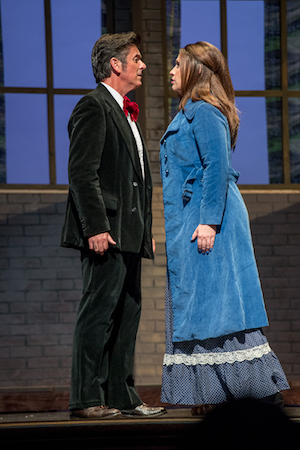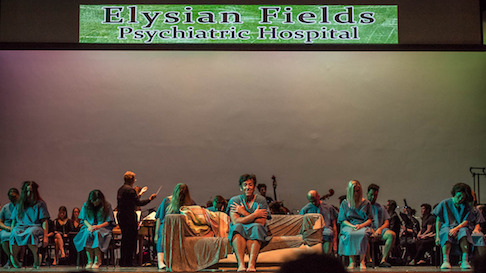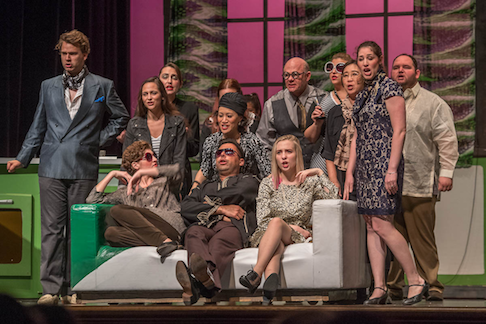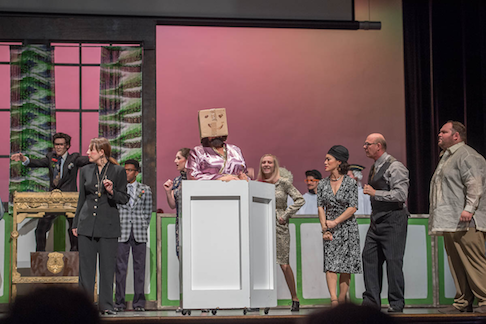Recently in Performances
English Touring Opera are delighted to announce a season of lyric monodramas to tour nationally from October to December. The season features music for solo singer and piano by Argento, Britten, Tippett and Shostakovich with a bold and inventive approach to making opera during social distancing.
This tenth of ten Live from London concerts was in fact a recorded live performance from California. It was no less enjoyable for that, and it was also uplifting to learn that this wasn’t in fact the ‘last’ LfL event that we will be able to enjoy, courtesy of VOCES8 and their fellow vocal ensembles (more below …).
Ever since Wigmore Hall announced their superb series of autumn concerts, all streamed live and available free of charge, I’d been looking forward to this song recital by Ian Bostridge and Imogen Cooper.
Although Stile Antico’s programme article for their Live from London recital introduced their selection from the many treasures of the English Renaissance in the context of the theological debates and upheavals of the Tudor and Elizabethan years, their performance was more evocative of private chamber music than of public liturgy.
Evidently, face masks don’t stifle appreciative “Bravo!”s. And, reducing audience numbers doesn’t lower the volume of such acclamations. For, the audience at Wigmore Hall gave soprano Elizabeth Llewellyn and pianist Simon Lepper a greatly deserved warm reception and hearty response following this lunchtime recital of late-Romantic song.
For this week’s Live from London vocal recital we moved from the home of VOCES8, St Anne and St Agnes in the City of London, to Kings Place, where The Sixteen - who have been associate artists at the venue for some time - presented a programme of music and words bound together by the theme of ‘reflection’.
'Such is your divine Disposation that both you excellently understand, and royally entertaine the Exercise of Musicke.’
‘And there was war in heaven: Michael and his angels fought against the dragon; and the dragon fought and his angels, And prevailed not; neither was their place found any more in heaven … that old serpent … Satan, which deceiveth the whole world: he was cast out into the earth, and his angels were cast out with him.’
There was never any doubt that the fifth of the twelve Met Stars Live in Concert broadcasts was going to be a palpably intense and vivid event, as well as a musically stunning and theatrically enervating experience.
‘Love’ was the theme for this Live from London performance by Apollo5. Given the complexity and diversity of that human emotion, and Apollo5’s reputation for versatility and diverse repertoire, ranging from Renaissance choral music to jazz, from contemporary classical works to popular song, it was no surprise that their programme spanned 500 years and several musical styles.
The Academy of St Martin in the Fields have titled their autumn series of eight concerts - which are taking place at 5pm and 7.30pm on two Saturdays each month at their home venue in Trafalgar Square, and being filmed for streaming the following Thursday - ‘re:connect’.
The London Symphony Orchestra opened their Autumn 2020 season with a homage to Oliver Knussen, who died at the age of 66 in July 2018. The programme traced a national musical lineage through the twentieth century, from Britten to Knussen, on to Mark-Anthony Turnage, and entwining the LSO and Rattle too.
With the Live from London digital vocal festival entering the second half of the series, the festival’s host, VOCES8, returned to their home at St Annes and St Agnes in the City of London to present a sequence of ‘Choral Dances’ - vocal music inspired by dance, embracing diverse genres from the Renaissance madrigal to swing jazz.
Just a few unison string wriggles from the opening of Mozart’s overture to Le nozze di Figaro are enough to make any opera-lover perch on the edge of their seat, in excited anticipation of the drama in music to come, so there could be no other curtain-raiser for this Gala Concert at the Royal Opera House, the latest instalment from ‘their House’ to ‘our houses’.
"Before the ending of the day, creator of all things, we pray that, with your accustomed mercy, you may watch over us."
The doors at The Metropolitan Opera will not open to live audiences until 2021 at the earliest, and the likelihood of normal operatic life resuming in cities around the world looks but a distant dream at present. But, while we may not be invited from our homes into the opera house for some time yet, with its free daily screenings of past productions and its pay-per-view Met Stars Live in Concert series, the Met continues to bring opera into our homes.
Music-making at this year’s Grange Festival Opera may have fallen silent in June and July, but the country house and extensive grounds of The Grange provided an ideal setting for a weekend of twelve specially conceived ‘promenade’ performances encompassing music and dance.
There’s a “slide of harmony” and “all the bones leave your body at that moment and you collapse to the floor, it’s so extraordinary.”
“Music for a while, shall all your cares beguile.”
The hum of bees rising from myriad scented blooms; gentle strains of birdsong; the cheerful chatter of picnickers beside a still lake; decorous thwacks of leather on willow; song and music floating through the warm evening air.
Performances

22 Sep 2016
The Rake’s Progress: an Opera for Our Time
On September 18th, at a casual Sunday matinee, Pacific Opera Project presented a surprising choice for a small company. It was Igor Stravinsky’s 1951 three act opera, The Rake’s Progress. It’s a piece made for today's supertitles with its exquisitely worded libretto by W.H. Auden and Chester Kallman.
The composer and his duo-librettists based their story on William Hogarth’s eighteenth century paintings and engravings. Stravinsky was living in West Hollywood when he wrote the music. Librettists Auden and Kallman were also in the US at that time.
Because The Rake’s Progress requires a chorus and a larger orchestra than POP usually offers, these performances were held at Occidental College, a charming school located in the hills north of Los Angeles. Director Desiree La Vertu guided about a dozen choristers from the college glee club through Stravinsky’s unusual harmonies while POP co-founder and conductor Stephen Karr led twenty-five of the school’s excellent instrumentalists as they accompanied the singers.

POP co-founder, stage director, and designer Josh Shaw updated his show to the 1970s but kept it in England. His simple settings effectively placed the action in the opera's various locales: the Cyprian Queen Pub, Mother Goose's seedy London strip club, Tom’s house, a wildly active auction yard, a cemetery and finally, the day room of the Elysian Fields Asylum. Marie Mawji’s ambient lighting design and Maggie Green’s seventies era costumes helped secure the time and place of each scene.
In Act I, Tom Rakewell works in Father Trulove’s pub along with Anne, but when Nick Shadow tells him he has an inheritance waiting for him in London, he goes off to pursue whatever pleasures the money can buy. In a thoughtless moment, Tom agrees to pay Nick for his services at the end of "a year and a day." Brian Cheney was a sympathetic, clear voiced Tom who—at the beginning—merely wanted a good life for himself and Anne, the girl on whose love he knows he can depend.

Rachele Schmiege was a strong Anne who held her ground both vocally and histrionically. Her aria “No word from Tom” probably brought back memories to a great many audience members who have waited for silent phones to ring. Patrick Blackwell sang Father Trulove with luxurious bass tones that made me want to hear a great deal more of him. Hope POP has him back in a larger part very soon. Adrian Rosas was a wily Nick whose solid voice and unctuous character seemed related to Gounod’s and Boito’s devils. One of the reasons for POP’s popularity is Shaw’s insistence on hiring the best voices available.
Adelaide Sinclair was a loquacious Baba the Turk with a strong voice and a constantly flapping black beard. When Tom dropped a box over her head, the audience had a good laugh and he finally got a chance to complete a sentence. Danielle Marcelle Bond was an alluring bawdyhouse manager, Joel David Balzun a memorable madhouse keeper and Robert Norman a fascinating auctioneer whose minions wheeled him around together with his outsized desk.

In the final scenes, especially the epilogue in which various characters warn listeners, often humorously but sometimes seriously, of the evil that can befall those who look for easy money. The audience could easily draw parallels between the final scene of this opera and that of Mozart’s Don Giovanni.
The artists and craftspeople who make up POP managed to make their work look easy while service people made sure audience members never lacked for creature comforts or glasses of something cool and tasty. A Pacific Opera Project performance is a fine place for a visitor to Los Angeles to relax on a fall afternoon or evening.
Maria Nockin
Cast and production information:
Music Director, Stephen Karr; Stage Director and Designer, Josh Shaw; Costumes, Maggie Green; Director of Occidental College Glee Club, Desiree La Vertu; Lighting Designer, Marie Mawji; Tom Rakewell, Brian Cheney; Nick Shadow, Adrian Rosas; Anne Trulove, Rachele Smiege; Father Trulove, Patrick Blackwell; Baba the Turk, Adelaide Sinclair; Sellem, Robert Norman; Mother Goose, Danielle Marcelle Bond; Keeper of the Madhouse, Joel David Balzun.



